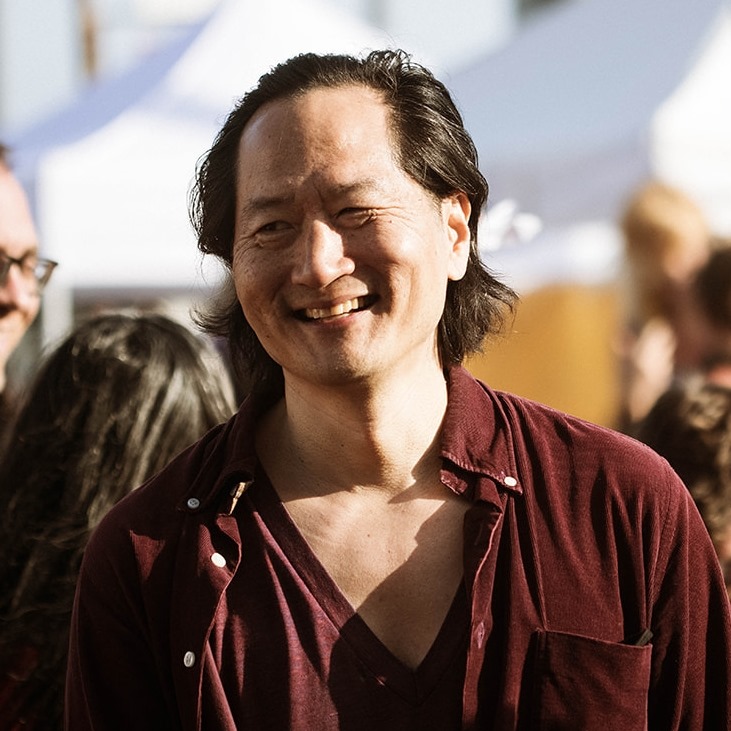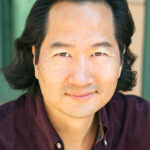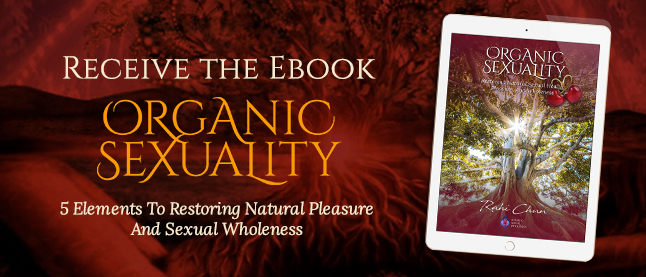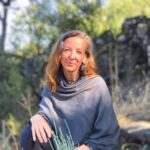
Exploring the Keys to Genital Dearmouring with Rahi Chun & Caffyn Jesse
Share this episode:
Caffyn and I have been dear friends and colleagues for several years now as we discovered we are kindred spirits in the ways we honor the soul and heart of nature and all of its expressions. We share similar values in the ways we hold space as practitioners prioritizing a client-led journey of sexual empowerment and restoration of agency, aligned with the true nature and desires of the body and its pleasure. It has been a joy to share and grow together as fellow souls on the path, friends and colleagues.

Rahi combines his training and experience as a CA state-certified Somatic Sex Educator/Sexological Bodyworker, Certified TRE Provider, NeuroAffective Touch Practitioner, Life Coach with an M.A. in Spiritual Psychology, with certifications in Family Constellations Therapy, DeArmouring Arts, Chi Nei Tsang & Karsai Nei Tsang, and STREAM (Scar Tissue Remediation and Management) in his facilitation of Somatic Sexual Wholeness. He also hosts the Organic Sexuality Podcast, and loves travel, meditation, spirituality and kombucha with sea salt vinegar chips.
Caffyn Jesse is a queer elder, sacred intimate, teacher and writer who revels in the power and pleasures of the erotic. They are a renowned teacher of sex, intimacy and healing trauma with pleasure. Encouraging neuroplastic change to support sexual healing and expanded pleasure, unwinding sexual trauma, exploring the intersection of sex and spirit, creating erotic community are all core to their work and play. Caffyn is a tireless advocate of embodied love.
We explore:
How genital dearmouring is an invitation to re-connect and explore a deepening intimacy between the genitalia and their body-owner
How repairing ruptures occurring within the body sequentially involves examining influences from our developmental and adolescent years before resolving those experienced in adulthood
How so much of releasing chronic guarding patterns within the tissues and fascia of the genitalia involves how safe an environment we can create for the body to yield and meet its own life force.
How the more the body’s choices and desires are advocated for, the more evidence the body has in recognizing it no longer needs genital armour
How genital mapping provides the body with greater awareness and specificity to advocate for its desires and deepen intimacy with one’s self and lovers
How important it is to move from the outer parts of the body’s erogenous areas slowly inwards, and only when the body feels an inherent trust and full-bodied “Yes.”
How the cervix can become armored from penetrative contact before there’s sufficient foreplay and how the upper left & right quadrants tend to elicit greater sensitivity in the dearmouring process
How the pressure one places on one’s body to perform sexually is a common way numbness and armour can form in the genitalia
How the pressure one places on one’s body to perform sexually is a common way numbness and armour can form in the genitalia
Rahi (00:02):
Welcome to Organic Sexuality, where we explore the restoration of pleasure, the reclamation of sexual sovereignty, and the realization of our embodied sexual nature. An invitation to honor the pleasures of your body by embodying the pleasures of your nature. I'm your host, Rahi Chun. I'm a certified somatic sex educator, a sexological body worker, and creator of Somatic Sexual Wholeness. Before today's interview, a reminder that registration for the three keys to Genital Deaming online course ends on January 29th with early bird pricing ending on January 20th. Apply coupon code podcast for $200 discount upon registration. All details can be found@somaticsexualwholeness.my kajabi.com. So, after several years of interviewing fellow somatic sexuality practitioners in the field, today, I had the joyous opportunity to be interviewed by my dear friend and colleague, Caffyn Jesse. Caffyn and I explore the influences that have informed my approach to genital dearmouring, including neuroaffective touch, developmental psychology, and sexological body work, as well as the experiences that have informed my space-holding, including vipasana meditation and plant medicine journeys with their inquisitive mind and generous heart. Caffyn is always a delight to explore such rich themes with.
Caffyn (01:53):
So here we are with Rahi Chun, and I've been following Rahi's work for many years now, and over the past few years, we've become dear friends, so I feel so lucky and honored and happy to be interviewing Rahi today for his own wonderful organic sexuality podcast. Mm. So while he's a hugely respected colleague, an esteemed teacher, a fellow somatic sex educator who's evolved his own unique teachings and brought them so generously into the field, uh, where it said just huge influence. So alongside his in-depth work with clients, uh, one-on-one over many years, Rahi has done in-depth studies in many areas of trauma and healing, anatomy, pleasure, empowered choice, and voice, and spiritual psychology. So Rahi has a very busy practice offering one-to-one sessions, mostly in Los Angeles, where he's based, and he also travels the world with his teachings. But wherever you live, uh, we're just so fortunate that Rahi is now offering an online genital diaring training, and we're gonna speak about that today.
Caffyn (03:11):
So I've had the privilege of receiving a genital diaring session with Rahi, and I can attest how his unique approach to this work has really astonishing positive impacts, because I've struggled with Vulvodynia for four decades. That's like four 40 years of genital pain. And so I wasn't expecting very much with a, a session, but with Rahi unique approach, I experienced a really unexpected, ecstatic dearmouring of both of my body, my, my genitals, and my whole body, and also my, a sense of that diaring of the soul. So that can sound pretty mystifying, uh, this whole process. So, Rahi, can you just explain a little bit about what Deaming is and how armor shows up in our body and in our genitals?
Rahi (04:03):
Sure. Um, thank you for that beautiful introduction, Caffyn. Um, yeah, it's a real honor to be interviewed by you. Uh, you know, I like to think of genital armor and the process of de arming as, uh, in a very simple way, reestablishing an intimate relationship and connection with our genitalia. Um, I feel like so much of how armor forms comes about as a result of a disconnect, and, uh, there's something in the way of really attuning to listening for and, and responding to the desires, needs, and voice of our genitalia. So it's really reestablishing and kind of like a reconnection with that part of our body.
Caffyn (04:55):
You, you hold space for dearmouring in such a unique way. Um, can you tell me something about how you evolved your unique approach to genital deaming, um mm-hmm
Rahi (05:11):
Sure, sure. Yeah. The way I often explain the approach of somatic sexual wholeness, um, is that we repair ruptures sequentially, starting with the influences from the client's body's childhood, because oftentimes our adult sexual behaviors, patterns and experiences and desires, uh, can be rooted back threaded back to events from our childhood. So I like to start there and do a thorough intake, and I like to go back as far as like, you know, what were the emotions during the gestation period, you know, before the birthing. And then of course, the birthing experience itself is very significant because that can pair oxytocin with certain emotions or certain, um, struggles or pleasures that can lead to patterns throughout one's life. So it's kind of, um, uh, investigating the influences during the developmental years. And then as we follow the trajectory of the body's evolution, usually in adolescence when, uh, a a young being is individuating, um, the, the family group kind of shifts from being their biological family to their peer family.
Rahi (06:34):
And oftentimes there are, um, instances affecting one's boundaries and consent because it's something we're not taught. And for a lot of us, it usually involves a lot of trial and error, and oftentimes a violation of boundaries. And so we really look at that individuation process and how was the body and one's sexuality affected, um, when it comes to its trust, its voice and its consent. And then usually those are like the building blocks that reveal how any armor shows up in the body as an adult. And so, you know, there's different approaches. Um, you know, I've been influenced by, um, the tantric approach, the Taoist approach, the psychosomatic approach, as well as the pleasure approach and rewiring pleasure, uh, as a way to dearmour. And I knew you've been, you've been such a great influence in that realm for me with all of the books and trainings.
Rahi (07:36):
Um, uh, but as far as like how my approach developed, honestly, you know, I wish I could say like I thought this through, but you know, as most practitioners know, it's our clients who are really the, the guiding lights and the, and the lighthouses that guide us, and that, you know, lead us to different inquiries. And, you know, early on it was just really clear to me that we have to really start with the safety within the nervous system. And that is really everything as far as how the body responds to touch, can attune to its desires for touch, um, can, you know, have oxygenated tissues to experience the pleasures. This is all rooted in the nervous system. And so I really love exploring how can we best create an environment for the nervous system to feel safe and yield to its own life force.
Caffyn (08:35):
Yes. Yielding to its own life force. I love that. One thing I've, I've loved experiencing with you and experienced you as a teacher, is in this exercise of, um, how do we as practitioners support a client in yielding to receive support mm-hmm
Rahi (10:09):
Rahi (11:18):
And so it can be repaired. Um, you know, as you mentioned, I've been very influenced by this modality, neuroaffective touch developed by Dr. Ailne LaPierre because it really is designed to address ways in which guarding formed during our childhood in order to protect our body. And when what was needed in brought to the body in adulthood, the body remembers that and can start to, um, release and, and yield into the safety that it wanted to as a child. And with that, you know, with the release of that past wound, then they can be with their adult intimate partner or with themselves and not get triggered into the past.
Caffyn (12:05):
It's so interesting. I, I'd love to see more research on this. Like they, they know that, uh, harmful touch or neglect neglectful, the, the absence of touch can have these epigenetic effects. Mm-hmm
Rahi (12:51):
Yes, yes. Well, we know that, you know, the effect of, um, touch in the brain development of infants. And what I've noticed within my clients, I, I find that the more there is safety with receiving touch and particularly touch that is pleasurable and pleasurable, whether that means reassuring, grounding, supportive, uh, you know, pleasurable to touch, there seems to be something that happens in their, within their nervous system where it feels safe to receive life force in other forms. So it's very common for me to see clients who were resistant to touch or felt like, okay, that's enough. When there's safety and there's an expansion of their vessel for receiving goodness, they start to get promotions at work. Their personal lives start to change, you know, the quality of their intimate relationships start to expand because here they are now feeling safe to receive.
Caffyn (13:49):
Yes, yes. And once you establish that basic safety, that yielding to receive support, that sense of being partnered in a, in a relational web, like I see you then move into the, the more, like the choice and voice you were saying, the adolescent mm-hmm
Rahi (14:19):
Well, I, I mean, something else I noticed with choice and voice, um, like it cannot be understated how transformational learning, I mean, it sounds simple to ask for what you want. I, I find that when the body has the evidence that it is gonna be advocated for both in its consent and its boundaries and its desires, the deaming, uh, happens much more easily.
Caffyn (14:52):
Right.
Rahi (14:52):
Because the body has this, it has this life experience. Yeah. And a kind of a, a positive feedback loop that starts to happen, the more it advocates for what it wants, and it receives the kind and quality of touch that it truly desires, then it encourages it to advocate more. And then there's less and less reason for this unconscious guarding to stay in effect,
Caffyn (15:16):
Right? So that trauma isn't just in the tissues, it's in an, it's in our personal histories. And also we live in a traumatic culture. On one of your podcasts recently, you were, you were speaking about how the aggressions of patriarchy, of racism, of all the oppressions that are the water we swim in, they're impacting our blood flow, our neuroendocrine functioning, and prohibiting access to pleasure. So what I feel with you is that, um, you generate a different way of being inside yourself and bring this counter normative cultural space into, into your work and into, into your, um, how you teach people to like a way of being, uh, with one another and, and with, with themselves. And so I wondered if you could speak about that a little bit.
Rahi (16:07):
Sure. Um, thank you for that reflection. Um, yeah. I really feel that, you know, nervous systems are really like tuning forks. And so, you know, we've all experienced, like if we go into an elevator and there's someone who's upregulated, we start to feel that anxiety. And, you know, the converse is true too. When we're with someone who's like, kind of zenned out drinking, drinking some warm tea, we start to feel relaxed as well. 'cause our nervous systems really do attune to each other. And, you know, this can happen on a grand scale, but in the session space, I really feel like the intention of the facilitator or practitioner is picked up on, on some level by the nervous system of the client or receiver. And so whether it's two lovers exploring intimacy, or a practitioner and a client, um, the intention of the space holder is really, really critical.
Rahi (17:11):
I, I feel like there are, um, you know, support guides and angels all around us just waiting for us to call on them. And, you know, before a client comes, I actually call upon the client's, um, spirit guides and angel guides and, and ancestors for, for, for witnessing support. Because what we're, what we're intending to do really is reconnect the life force with its own energy. And that's gonna ripple through, you know, the ancestral lineage through, through all of that. So I'm calling on all of these, you know, uh, support guides. And yeah, I do feel like the more empty I am as a practitioner in service of attuning to how the life force wants to meet itself, uh, the less interference there is, you know, within the session.
Caffyn (18:04):
Oh, I love that. The more empty you are as a practitioner, the more you're getting out of the way of this life force wanting to reconnect with itself.
Rahi (18:15):
You know, like, I actually don't, like, I always have kind of a rough, um, and I share this with the client, like a rough outline of how, what, what modalities can be applied during the session, but ultimately it's up to the client's body. And more than that, it's up to the client's body's life force. And it's my job to attune to that and obviously check in with the client to make sure that they're, uh, feeling a full yes to it, but it's really attuning to how Lifeforce wants to meet itself.
Caffyn (18:47):
Nice. Ooh. Yes. Can you say anything about what brought you to that, that way of being, which I, I just like, it's so beautiful to be connected with you or in your presence, uh, and, uh, yeah. What, uh, a, a, a yummy experience your, your students are gonna have, like showing up for your, your Zoom calls and getting your support, um, because that, uh, you know, that safety and belonging are what people feel in, in your presence. And, uh, and this, uh, careful caring connection and tracking and noticing, uh, the people, noticing each person with exquisite attention. That's, uh, like your, your magic rahi. And I'm just like, curious about, like, yeah. How, how did you learn that? And then how do, how do you support your students in, in getting that?
Rahi (19:49):
Oh, well, thank you for that, for those reflections. Um, I'm a little embarrassed to hear all of those that praise. Um, um, you know, I have to really go back to, um, I don't know if I've ever shared this with you Caffyn but, um, you know, I, I, I had an experience, uh, uh, in the north of Thailand. I was staying at a Buddhist monastery for a 21 day Vipassana retreat. And it was somewhere around day 13 or 14 when I just so much pent up emotion had been processed and metabolized. I went through all of this kind of dramatic inner turmoil. Do I stay, do I leave? And by the 10th day, I had kind of dropped into kind of this zone of, of meditating, you know, 12 to 13 hours a day, an hour sitting, an hour walking an hour sitting an hour walking.
Rahi (20:45):
And, um, it was in the midst of this walking meditation. Uh, I remember the shrine, I remember the, the cold floor tile. 'cause it was very humid outside in the summer. And in the midst of it, something happened, and it's really hard to put into words, but, um, the, the eye that I identified myself with had kind of evaporated. And I was, I was just this awareness in the field, and I was, the awareness in the field was able to see this body that, you know, was rahi engaging in this walking meditation, but the awareness was in the walls, it was in the ceiling. It, it was just everywhere. And something about that experience has, has guided me, I think, ever since. And so, you know, whether I'm on the dance floor with ecstatic dance, it's, it's really wanting to drop that identity and be the awareness. And so that's how, you know, that's what I love about sessions. Um, you know, if I can drop that and, you know, I can drop that whilst trusting that my, uh, training and experience knows how to facilitate, you know, uh, if a trigger happens or if there's some kind of space holding in particular that needs to happen. But it, it really allows for kind of the field to come in and facilitate the session,
Caffyn (22:26):
Like aligning with the, the great awareness that is in everything. Yeah. Yeah. I really aspire to do that too, in my own ways. Yeah. The, I mean, it's very resonant with, with my own practice, which I come at from a diff bit of a different angle, more from, uh, like the physics of it, quantum consciousness Yeah. Where all is ever emergent Yeah. In the relational field. Uh,
Rahi (22:56):
Right. And I think, I think those of us who are drawn to, or are practiced in, you know, kind of these practices of that surrender the ego, whether it's, you know, deep meditation or working with plant medicines like such, even even erotic energy, um, you know, at to a, at a certain, when there is a prolonged state of erotic energy, it can be like a psychedelic state where the ego disappears and there's just this primal life force that wants to meet itself.
Caffyn (23:27):
Yeah. And, and any orgasm, no matter how it, it is in a sense that it's like mm-hmm
Rahi (24:28):
Caffyn (24:44):
And
Rahi (24:44):
So what I'm hearing you share is that that experience when it is mindfully and intentionally, um, held, it can be, uh, almost like reconditioned in a way. Yeah. Yeah. Where one is at choice of the environment and the circumstance that they are choosing to engage in, in order to re-experience, uh, that story. But from an empowered place of choice.
Caffyn (25:10):
Exactly. Like how we hold those traumas in our tissues mm-hmm
Caffyn (26:20):
Mm-hmm
Rahi (27:14):
Yeah. Yes, yes. Yeah. What you're speaking to is really, really what I love about, you know, this work. I, I, it is holy work. It's divine work where we can take something, you know, it's almost like the lotus flower growing out of the darkness because we're, we're taking a story that the body has experienced this pain and traumatic and disempowering, and we're consciously bringing elements of choice and voice, of understanding how to voice one's pleasure, desires, consent, boundaries, and really rewriting that script in the body so that what was once disempowering is now like a field of empowerment for the body. Um, and that is just, it's life changing.
Caffyn (28:03):
Yeah.
Rahi (28:04):
And, and this is where, in regards to the genitals and working with the genitals in our field, genital mapping is such a cornerstone. And I feel like this is why it is so important because once, once the body learns how to advocate for itself, you know, the difference between, you know, I want my vulva touched and being so specific to be able to attune to and say, I, I want the upper left quadrant of my clitoral glands to be stroked, you know, about one second per stroke. I mean, it's so night and day different. And that, that really brings so much more specificity and sensation and intimacy to the relationship between one, one and one's genitalia by, you know, going through a very exquisite mapping process. Yeah. Not of the, not only of the genitals, but of the whole body.
Caffyn (28:56):
Can you describe, like, about how you engage with, with a person, uh, in that mm-hmm
Rahi (29:04):
Sure. Sure. So, um, yeah. We always start from the outside in. The first kind of terrain to get familiar with is to understand how the nervous system, what the nervous system needs to feel safe. So that is a fully clothed process. Um, and whilst they are clothed, again, we start from the outside in first, we're using props like, uh, pillows and blankets, and then we'll bring in touch, but the person remains clothed. And then only if the the client feels ready to move further, then they can disrobe to the degree they feel comfortable and start receiving touch. And this is where the mapping process starts. The touch is different kinds in quality. It could be a feathery stroke, it could be, you know, more of a glide sensual stroke. It could be a firm present stillness, but each different body part can learn what its preferences are and what makes it feel good.
Rahi (30:05):
And during this process, we focus on the 11 erogenous zones of the body that elicit a particular, um, responsiveness. Uh, it's not always all 11 on all bodies, but usually people learn something new about the back of their knees or their ears or the back of their neck or their lower belly. Um, because it's very intentional. And this is the other thing I love about our field, is there's such a, a priority on one way touch, which I just think is magic. Um, and, you know, I've had couples, I think we've all had coup a couple clients who were married for decades, and they've never explored one way touch. And it is such a teacher, it is such a, a liberator, uh, an education, just like this whole research data you get to collect about your lover's body and what they prefer. So then we, we do the 11 erogenous zones, and again, we work from the outside in.
Rahi (31:02):
The ERO is of the hands and the feet, the ears, the back of the neck are furthest away. And then we eventually move closer and closer to the more vulnerable parts of the body. Um, and we do all that before we do any pelvic touch, because there needs to be that evidence that the body has, that it can trust this, touch, this dynamic, and its own voice in advocating for what it wants. And then when we get to the pelvis, then the mapping can get very, very specific. And again, we go from the outside in, um, you know, the upper thighs, the crease, the outer labia, and we're always looking for the full bodies. Yes. Before we move further either to the clitoris or to the internal vaginal canal. Um, you know, where there are just so many distinct, uh, erogenous areas that deserve specific, uh, attention and attunement.
Caffyn (32:04):
Yes. I mean, you know, could, could you like describe one or two of, like, say, uh, when we were working with my genitals, you got around the cervix with some special touch that was like, quite incredible because, you know, I don't, yeah. Like, there it was like nerves that had never been touched, and then you were rewiring them, like with some external touch, which was more, uh, used to being pleasured and mm-hmm
Rahi (32:53):
Rahi (33:52):
So the cervix gets banged up against, and so that can, you know, really armor the cervix. And so, honestly, Caffyn, I, I mean, the way I've learned to dearmouring, the cervix and, and what you experienced was a lot of it was like the intention of the touch, you know, to touch from a real heartfelt intention so that the cervix, you know, in Chinese medicine, the cervix is correlated with the heart organ. So it really responds to love, whether that's the, you know, uh, practitioner's love soul to soul to a client or in an intimate situation. Um, but just to touch with love. And, you know, I first explore areas around the, the, the cervix, um, that are responsive. And if there's any kind of responsiveness, and it could even be pain or discomfort that's better than numbness, or that's like a starting point.
Rahi (34:50):
And oftentimes the one o'clock and 11 o'clock, um, kind of the upper right and upper left quadrants, uh, tend to be more sensitive than the other areas. So, you know, I, I can, I can focus there to just expand that friendly, friendly, safe touch and allow that to spread. And it's almost like, you know, it's almost like a scared animal. It's like once it, it's gonna be guarded and, and kind of hypervigilant if all its experienced before was unwanted, you know, like contact. So once you know it needs to build, there needs, there's a lot of trust building that happens. Um, and, you know, one of the methods that you mentioned is if there is a part of the body, like the clitoris, for example, that is used to eliciting pleasure, you can concurrently stroke the armored area, uh, in this case, the cervix with the clitoris, and something happens with the brain where it's experiencing pleasure in an air and, and touch. And we're very Pavlovian in that way where we can get rewired. And, um, and that can be done not only with the cervix, but really any, any two areas of the genitals or even the body. Like sometimes, you know, clients may not have a lot of, uh, nipple or breast sensation, but if you start pairing it with clitoral strokes or something of that sort, then then things can shift.
Caffyn (36:25):
Yeah. And in an environment of, of loving of love and yes, loving touch, that's so key to neuroplasticity to have that bath of oxytocin. Yes. It's, uh, yeah. It's so interesting, eh, like how the Yeah. Rewiring can happen, but having that chosen, like choiceful rewiring of like how we want to grow our nervous systems, it requires that that loving environment, that like heartfelt presence and, and, uh, empowerment, like a feeling of, I'm, I'm at choice. I get to change my mind at any time, but actually as a, a neuroendocrine state that we've, that we cultivate so that we have neuroplasticity
Rahi (37:17):
Mm-hmm
Caffyn (38:16):
Yeah. And when we have these big, expansive experiences like, like working with a professional, we also are gathering tools that where we have choice to like, keep that expansion going, uh, in our lives, especially with these techniques that you're teaching and offering in your, in your online program. I was wondering if you had some stories about, um, working with, with clients. I, I always, uh, I'm, I'm curious to hear a story about you working with a man, because I think like men working with men are mm-hmm. Like really is a place where so much cultural and personal transformation can happen.
Rahi (39:00):
Yeah. Let's see. Which, which story to share. I mean, like, there've been, um, like, just a few things I wanna share, uh, at the outset. Um, like I've had clients who, for example, I had a 69-year-old gentleman come to me because he learned he had prostate cancer, and he had never explored the pleasures of his prostate. You know, like at, uh, like at any age, like the wonders of the body are waiting, they're like gold mines to be discovered, you know, they're like treasures. And when he experienced his first prostate induced orgasm, you know, as we know, uh, you know, analogous to, you know, what I've been told is the experience of a cervical orgasm, because the vagus nerve, you know, innervates both the cervix and the prostate, like it was kind of a spiritual experience for him. It, it just opened up so much for him.
Rahi (39:56):
Um, so I, I mentioned that, uh, not as a case study, but as an encouragement for penis owners out there to, to lean into exploring anal pleasure and specifically prostate health and prostate massage and prostate pleasure, if it's of any interest to you, because there's so much to explore and be discovered there. Yeah. I've had some clients recently, um, who were, who were men, gay men, two in particular, you know, I'm kind of lumping them in this because they shared the same thing of, you know, growing up in the Midwest where they knew they were gay, but they had to really closet it and, and stay hidden until they moved to either New York or la. And, and then it becomes such a ecstatic, yet, uh, not always safe exploration of this energy that's been pent up and repressed for a long time. And so oftentimes the freedom, the sudden freedom to explore in, in clubs or in communities becomes a thing of experiencing penetration or being penetrated when there's not necessarily a lot of presence and consciousness around it.
Rahi (41:13):
And from that can come armor. Um, so, you know, certainly from the pressure to perform or from the desire to prove one's virility by just enduring. And so, um, yeah, there can be numbness that forms around the anal sphincter or around the shaft of the penis. And, you know, this is where deaming, the basics of what we've been speaking about, making sure the nervous system feels safe to receive, empowering the body's choice and voice mapping so that there is an, an ability to attune to, and then give voice to the specific areas of the sphincter, the different quadrants, the internal external or the different areas of the shaft. Um, and then really engaging in the kind of fundamentals of deep breathing presence, allowing emotions to flow and rewiring armored areas with pleasurable areas.
Caffyn (42:17):
Beautiful. Yeah, I feel like, oh, this culture is so, like, really cells, men short when it comes to eroticism. Like, so few men get a chance to explore soft penis pleasures and like explore, like, so often the, the first touch they receive is, is like actually cutting off the foreskin when they're an infant. And then like, they show up for eroticism, like thinking they have to have a hard penis and like rough high friction strokes and just like, oh my gosh, there's so much to explore, so much joy and juiciness in the erotic responses that can be opened up with, with mindful touch of, of all the, all the genitals. Um,
Rahi (43:13):
Yeah. I so agree. I think, um, like in a thousand years, people are gonna look back at, at this kind of era where there's no sex education, we're all sexual beings, we all have the same issues. No one talks about it. It's gonna be looked at as this really bizarre, like, yeah. Like what are these, what are they doing?
Caffyn (43:33):
Rahi (43:39):
You know, we have this, um, natural organic pharmacology of chemicals and feelings and sensations to heal, you know, in our own body. And, you know, like I, I really, you know, I know that good sex is medicine, heightened erotic states can transform consciousness. Oh. I mean, these are things that are in our bodies
Caffyn (44:03):
And, and just like so much joy to have and to, to share. Mm-hmm. Like, yeah. And yeah, here's, here's a quote from a client from your website. I have experienced a fundamental resurrection. My whole pelvic floor has come alive more than it ever was before, even before the six surgeries. Frozen traumatic energy has been liberated and transmuted, fueling enormous amounts of motivation, confidence, stamina, and creativity. The transformation ha have been rapid and the change sustained. That's the kind of experiences that Yes. Like clients are, are having. And I'm so happy that you're teaching Rahi and like talk about finding ways to, to be of service to Yeah. Instead of trying to fit everybody into your practice,
Rahi (45:43):
Yes. That's, I mean, that's always been, um, kind of a dream of mine because so many of my clients have said, oh, if my partner could learn this, you know, a lot of people just like learning in the privacy of their own bedroom. And so there's a special rate, um, for couples for the, for the genital disarming course where they can just move at their own pace and their own time in the privacy of their own home.
Caffyn (46:07):
Yeah, that'd be so lovely. And a new relationship too. I've just got a new wonderful relationship I'm exploring and just be, oh, whoa, what? That would just be such, create such a ecstatic playground and also sharing, you know, like details of our traumas and, and uhhuh, how that gets held in the body even at almost 70. Yeah.
Rahi (46:38):
Yeah. But you know, that is, that, that's actually an integral part of the course for couples is, um, we do invite each person to take inventory of the influences that have affected their sexual embodiment so that they have a sense of, um, you know, what makes them feel safe, what makes them wanna go into fight flight or Fawn. And then choose to share that with their partners, because so often the partners think it's about them and take it personally. You know, when someone goes into freeze or you know, says no, and just understanding each other's histories can bring so much more empathy and compassion and, and, you know, not take things personally because it's usually not about them.
Caffyn (47:26):
Beautiful. Mm-hmm
Rahi (47:37):
Our, um, our in-person couples retreat for February is actually sold out now. Um, yeah. So that's sold out, but Ariel and I will be driving across country from Boston to la uh, sometime later this spring. And we haven't, like, identified exactly what route we're gonna take, but we do wanna offer opportunities to teach and train in sessions along the way. So it looks like Austin and Sedona are musts. We're looking at Atlanta and possibly Virginia Beach as other possibilities. So if you're somewhere along the way and there's an interest in us teaching your community or, uh, your friends groups or receiving a couple session from us, then uh, feel free to inquire.
Caffyn (48:26):
How beautiful. Yeah. Oh, so is there anything else that we haven't touched on that you'd like to share with folks?
Rahi (48:37):
Well, we've touched on so, so many things. I just wanna share what a delight it is to converse and connect and commune with you. And I think our listeners know what a tremendously brilliant and bright light you are. And, uh, thank you so much for holding space for this exploration today.
Caffyn (49:04):
All right. It's really been my pleasure and my honor to just, I'm like maybe your biggest fan. I just love you and, and love your work in the world.
Rahi (49:18):
I love you too, Caffyn. How is today's episode landing in your body right now? How is your intimate connection, communion, and communication with your own genitalia? Is there a clarity in listening and attuning for what their needs, desires, and expressions are? And if not, what are ways you can lean into inviting such clarity and attunement for yourself and for your body? If you're interested in hosting a workshop retreat or receiving couple sessions, as Ariel Szabo and I travel through the US this spring, feel free to reach out to me directly at rahi@somaticsexualwholeness.com. Links to the three keys to Genital Deaming Course, and the Divine Union for Lovers signup page can both be found@somaticsexualwholeness.com. Until next time, take good care.
Get Podcast Updates
Enter your name and email address below to receive insights behind each Organic Sexuality Podcast episode and the ebook Organic Sexuality, 5 Elements to Restoring Natural Pleasure And Sexual Wholeness
Featured Episodes
With some of the wisest Somatic Sexologists in the Field.
Dr. Aline LaPierre
Susanne Roursgaard
Devi Ward Erickson

Dr. Liam Snowdon
Kimberly Ann Johnson
Dr. Ellen Heed
Keli Garza
Kris Gonzalez, L.Ac.
"Coocky" Tassanee Boonsom
Dr. Betty Martin
About the Show
We explore the restoration of pleasure, the reclamation of sexual sovereignty, and the realization of our organic sexual wholeness. We engage with leading somatic therapists, sexologists & sexological bodyworkers, and holistic practitioners worldwide who provide practical wisdom from hands-on experiences of working with clients and their embodied sexuality. We invite a deep listening to the organic nature of the body, its sexual essence, and the bounty of wisdom embodied in its life force.

Rahi Chun
Creator: Somatic Sexual Wholeness
Rahi is fascinated by the intersection of sexuality, psychology, spirituality and their authentic embodiment. Based in Los Angeles, he is an avid traveler and loves exploring cultures, practices of embodiment, and healing modalities around the world.










